Experts Say You're Wasting Your Money on Vitamin C Unless You Know This One Thing


Of all the skincare ingredients I love (niacinamide to treat fine lines, peptides for plumper skin, retinoids… need I go on?), vitamin C might be the one I love the most. That's for two reasons: The first is that it's a true multitasker and has myriad benefits. (More on that in a minute.) The second is that it's made a big difference in the state of my skin. Over time, it's made my skin look brighter and more even toned.
That doesn't mean I'll use any old vitamin C product that comes my way. In fact, it's quite the opposite. I'm very picky about the whole thing, and I only hold a few vitamin C products in high enough esteem to give them a spot on my bathroom counter. It's not that I'm being finicky; it's that choosing the right one matters. Using it correctly matters too. Ahead, discover everything you need to know before using vitamin C—straight from an aesthetician.

The Benefits of Vitamin C
First, let's talk about the benefits of vitamin C and how it functions in the skin. According to SkinSpirit lead aesthetician Karen Fernandez, "vitamin C is an antioxidant that helps reduce environmental damage."
In other words, it fights those pesky unpaired electrons that we call free radicals. If you didn't know, free radicals come from all sorts of different things, including sun exposure, pollution, and even normal metabolic processes in the body. They can damage DNA and lead to signs of aging, like fine lines and wrinkles. The antioxidant function of vitamin C prevents that from happening. "It surrounds the skin cells and deflects triggers that want to harm your skin," Fernandez says. "I think of vitamin C as 'your internal SPF' designed to protect and embedded in your epidermal skin layer."

The best part is that vitamin C does double duty. It's an antioxidant, and it also functions as a skin brightener. Over time, vitamin C can brighten dullness and lighten dark spots and hyperpigmentation. In other words, it can give you a more even-toned complexion.
It works for all skin types, regardless of how dry or oily you are or what concern you're trying to tackle. That goes for all antioxidants. "Antioxidants are good for all skin and skin types," Fernandez says. "They prevent damage and also visibly brighten skin."

Are there any potential downsides?
While vitamin C is unrivaled as a skin-brightening antioxidant, there is a catch, and that's that it's notoriously unstable. If it breaks down (or oxidizes) before it hits your skin, it'll be rendered ineffective. What's more, the oxidized vitamin C could potentially cause irritation and blackheads.
"That is the downside of vitamin C," Fernandez says. "It can be unstable, which means it can be made ineffective by environmental factors, like too much light or heat. For most formulas, the color will darken, and it will have an incorrect balance of actives and alcohol."
How do you make sure your vitamin C is stable? Fernandez says all you need to do is check the color and smell of the product. If the color is darker than it was when you bought it (for example, if it turned a dark brown) or it smells a little funky, toss it. It's not worth using anymore. It's already oxidized, and you simply won't be getting the benefits you once were. To prevent this from happening, Fernandez recommends making "sure to store in a temperate place with no direct sunlight or heat fluctuations."

How to Use Vitamin C
Fernandez recommends using vitamin C daily and in the morning under sunscreen. "It is designed to protect your skin and can do that all day," she says. Just know antioxidants can benefit the skin both morning and night, which is why she also recommends incorporating an antioxidant serum into your nighttime routine. "Some antioxidants have reparative aspects and will regenerate the skin's cells at night while you sleep," she says. "This rebuilds and replenishes cells from the inside out, leaving skin refreshed in the morning and able to defend against the day's aggressors."
The only time you shouldn't use vitamin C is when your skin is sensitized from an in-office treatment. While Fernandez says there are formulas out there that are designed to help the healing process and can be good for post-treatment skin, the majority are not: "Unfortunately, most over-the-counter vitamin Cs are not medically formulated and will just irritate skin that is already sensitized."
What shouldn't you mix with vitamin C?
While some antioxidants (like vitamin E and ferulic acid) can supercharge vitamin C's benefits, other players don't interact too well with the ingredient. See below for a few callouts.
- AHAs and BHAs: AHAs (think glycolic acid, lactic acid, mandelic acid, etc.) and BHAs (like salicylic acid) are intense skin exfoliators. When combined with potent vitamin C, it can lead to irritation.
- Retinol: Similarly, retinol is generally a very potent, unstable active—and so is vitamin C. Having the two active ingredients competing for the same real estate is a recipe for irritation and skin barrier damage.
- Benzoyl Peroxide: Benzoyl peroxide (you know, that acne-clearing hero!) is an oxidizer, which means it can render vitamin C ineffective. Vitamin C naturally oxidizes over time as it becomes exposed to light and air, so you definitely don't want to speed up the degradation!
- Niacinamide: This one's a little tricky. Some people report flushing and inflammation when using niacinamide and vitamin C in the same routine. Others fare totally fine. If you have a preformulated product that combines both ingredients, you're probably A-okay since those formulas are likely already tested for compatibility. If you have stand-alone vitamin C and niacinamide serums, though, you might want to proceed with caution—especially if you have sensitive skin.
Is vitamin C good for your face every day?
In short, yes! Fernandez recommends incorporating antioxidants into your routine twice a day—morning and night—and vitamin C is a solid choice. If you're new to vitamin C, perhaps start slow with a few days per week and work your way up to a daily cadence, noting any potential irritation.
The Best Vitamin C Products, at a Glance
- Best Overall: SkinBetter Science Alto Advanced Defense and Repair Serum
- Best for Acne-Prone Skin: Revision Skincare C+ Correcting Complex 30%
- Best With Vitamin E: SkinCeuticals C E Ferulic
- Best for Mature Skin: IS Clinical Super Serum Advance Plus
- Best Budget: Naturium Vitamin C Super Serum Plus
Shop 10 Effective Vitamin C Products
We have a full guide to vitamin C serums for you to browse, but feel free to check out some standouts below.
Best Overall: SkinBetter Science Alto Advanced Defense and Repair Serum
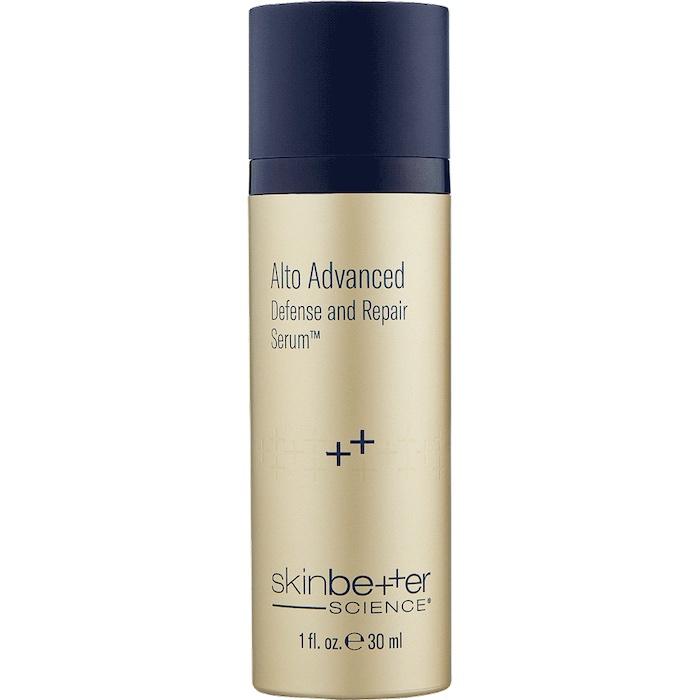
Fernandez calls this her absolute favorite vitamin C serum. "It has both functions of protection and regeneration—best used a.m. and p.m. This is my go-to for anyone with pigment issues. It is a broad-spectrum antioxidant and is a 100% stable formula in an easy-to-use container," she says.
Customer Review: "From someone who had hormonal acne, I now have small dark/red spots on my skin. I feel that this has really helped brighten my skin and give me the glow that I've always wanted. Will continue to use. I'm on my fourth month of product."
Product Details: 1.0-ounce bottle
Best for Acne-Prone Skin: Revision Skincare C+ Correcting Complex 30%
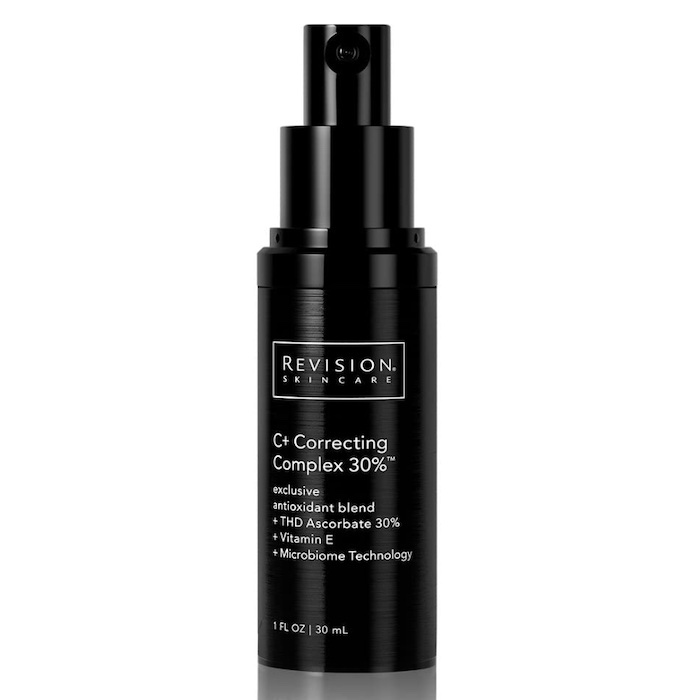
Fernandez calls this "a more straightforward vitamin C [that's] very stable and easy to use." She says it's great for sensitive and acne-prone skin specifically, and its light and creamy formula doesn't dry out the skin or leave a residue. "It's medical-grade, meaning full efficacy with no fuss," she adds.
Customer Review: "This might me the single best skincare product I've used. I typically have an uneven skin tone/lots of redness & was struggling with dull skin. My skin is so brighter and more even-toned! This product will have you glowing! I will say it took a while to notice a difference (about 6 weeks of a consistent routine probably) but it's absolutely worth it. You won't be disappointed. I'm ordering more now!"
Product Details: 1.0-ounce bottle with pump
Best With Vitamin E: SkinCeuticals C E Ferulic
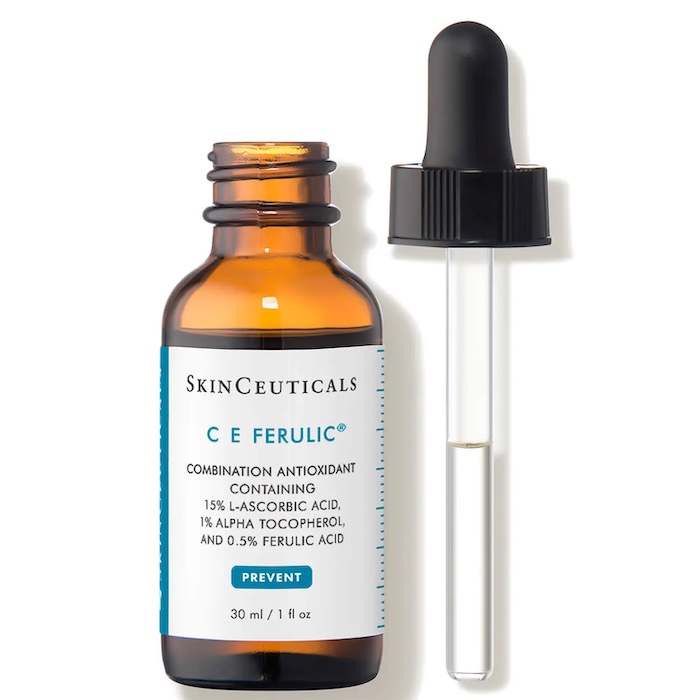
"SkinCeuticals C E Ferulic is a classic and was our first exposure to high-quality vitamin C," Fernandez says. "It is still a winner—some love the liquid formula (except when it spills), but it's also more volatile in its stability and needs to be stored carefully."
Customer Review: "I started using this in 2018 and then stopped for a while and came back to it and I forgot how amazing this product is! It absorbs into the skin magically, protects it from outside pollutions, and makes your skin glow. If you're investing your money into any skin care product, this one is a great start!"
Product Details: 1.0-ounce bottle with dropper
Best Vitamin C Moisturizer: Laneige Radian-C Cream With Vitamin C
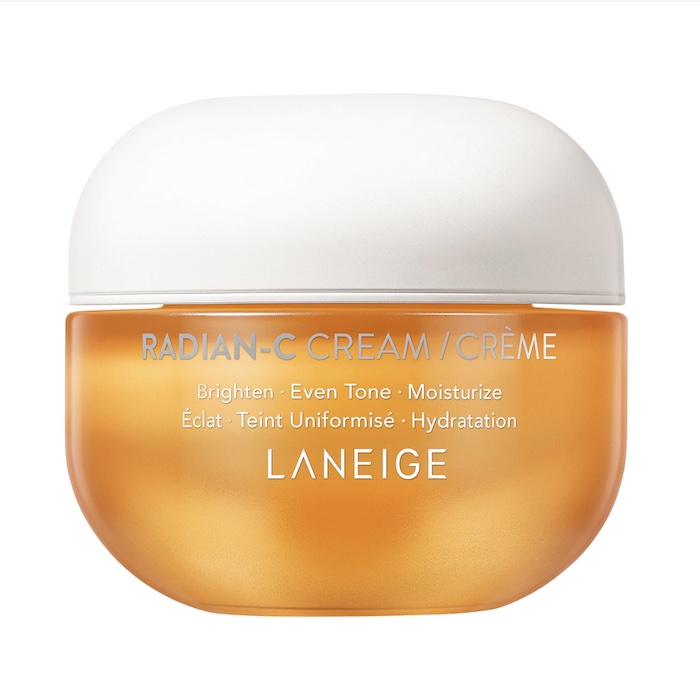
This moisturizer is enriched with vitamins C and E, so it visibly brightens and smooths the skin.
Customer Review: "I absolutely love this moisturizer. It has brightened the appearance of my skin, brightened, and evened it out. I switched to try another brand I hated and came right back to Laneige. This didn't break me out, I feel like my skin actually absorbs it. I cannot say enough good things!"
Product Details: 1.0-ounce jar
Best for Sensitive Skin: Renée Rouleau Vitamin C&E Treatment
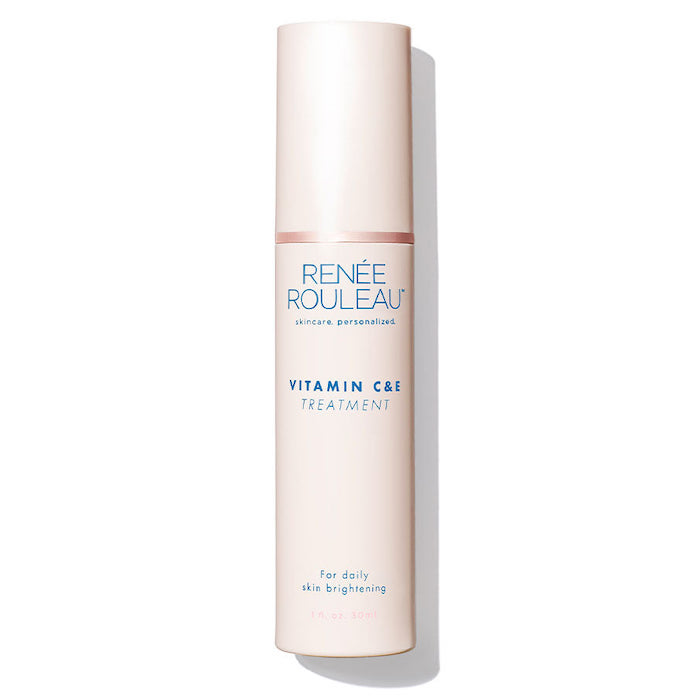
This serum has a light, creamy texture and contains both lipid and water-soluble forms of vitamin C, meaning it can penetrate deep into the skin. Even though it's incredibly effective, it never irritates my dehydrated, redness-prone skin.
Customer Review: "This serum has a great texture and glides over your skin. I like that the texture resembles a super lightweight moisturizer vs. a traditional liquid or clear serum. I have slightly sensitive skin and this serum does not sting [and] I've never had an adverse reaction. This serum definitely helps keep my complexion bright!"
Product Details: 1.0-ounce bottle with pump
Best for Mature Skin: IS Clinical Super Serum Advance Plus
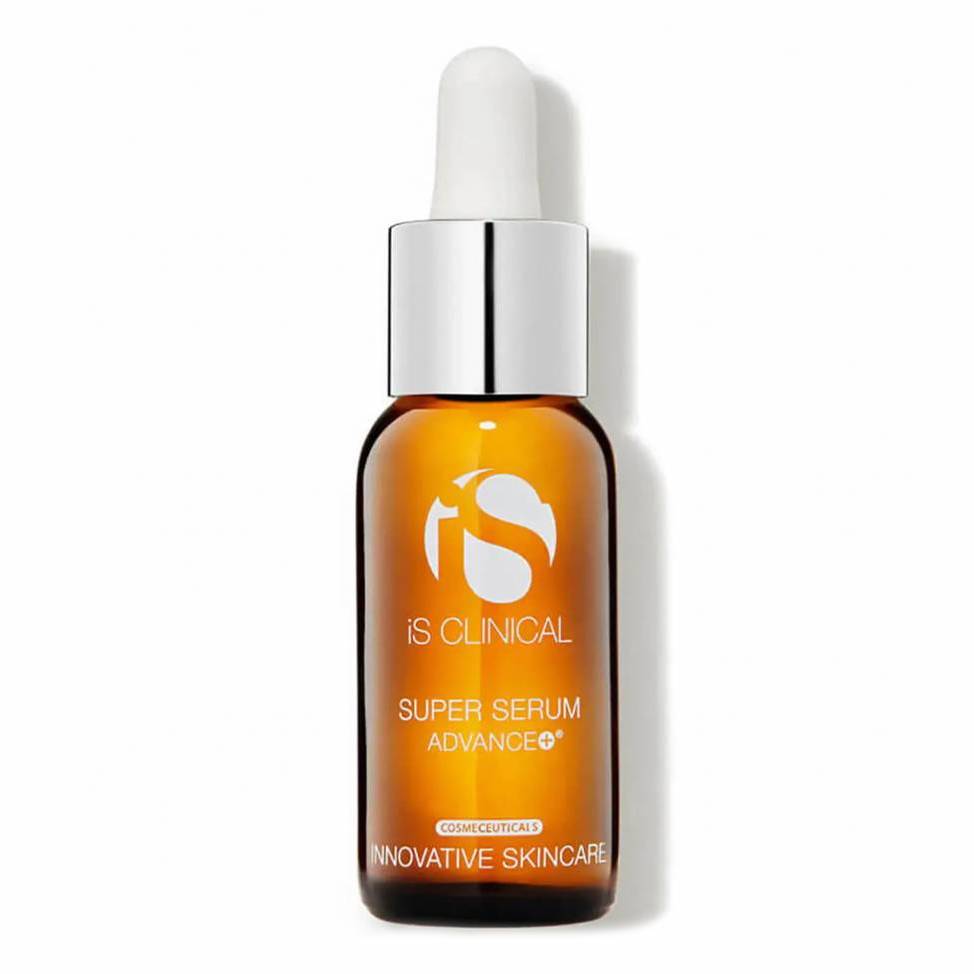
This serum is so effective the brand promises it will even work on stretch marks and scar tissue. It uses vitamin C, amino acids, vitamin B5, centella asiatica, and zinc sulfate to smooth the skin and encourage collagen production.
Customer Review: "This is my holy grail serum in my morning routine. I have healed all my acne and use this as my daily vitamin C to aid in healing atrophic acne scars and hyperpigmentation. When I first started using this it did sting a little, but now my skin is used to it. I've noticed a difference in my scars for sure."
Product Details: 1.0-ounce bottle with dropper
Best Vitamin C Face Oil: Sunday Riley C.E.O. Glow Vitamin C + Turmeric Face Oil
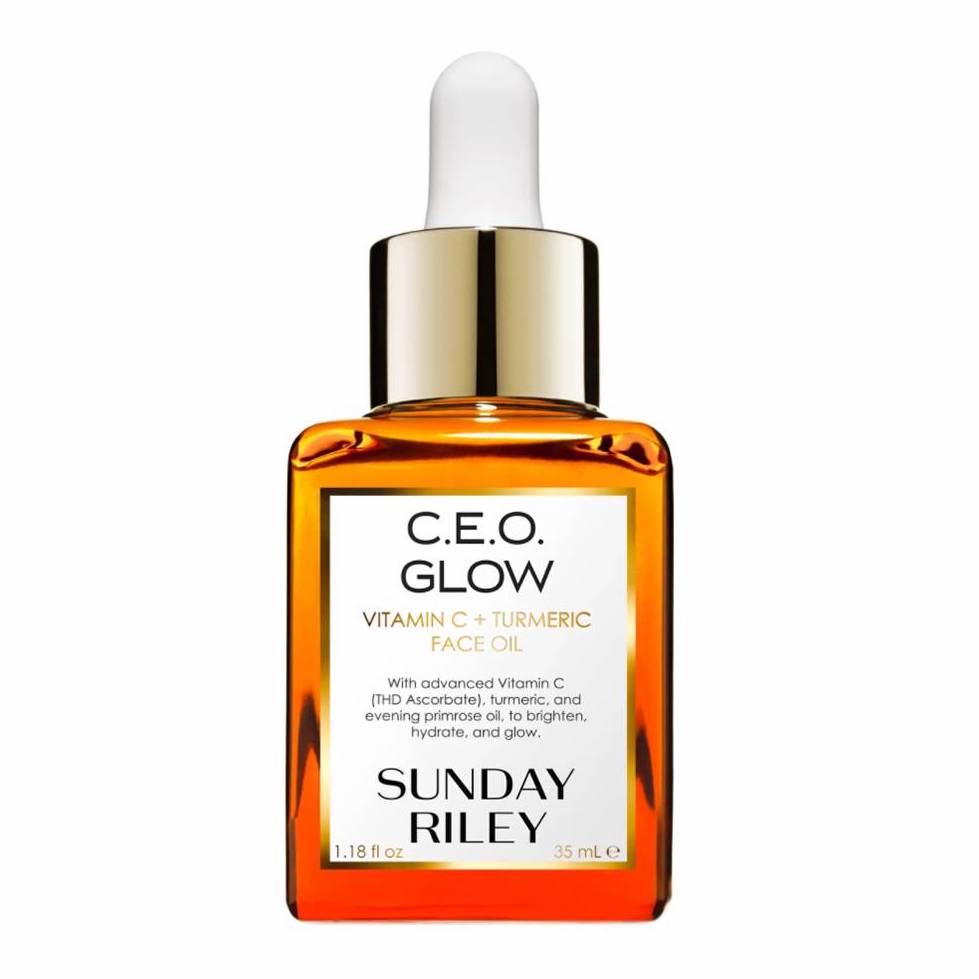
With a unique oil-based formula, this vitamin C product is great for anyone who struggles with dryness.
Customer Review: "I love this product from the first use. It made my skin feel soft and moisturized without being greasy. A little goes a very long way. It is a bit pricey, but as I find with all the Sunday Riley skin products you only need a tiny drop each use."
Product Details: 1.18-ounce bottle with dropper
Best Multitasker: Paula's Choice C15 Super Booster
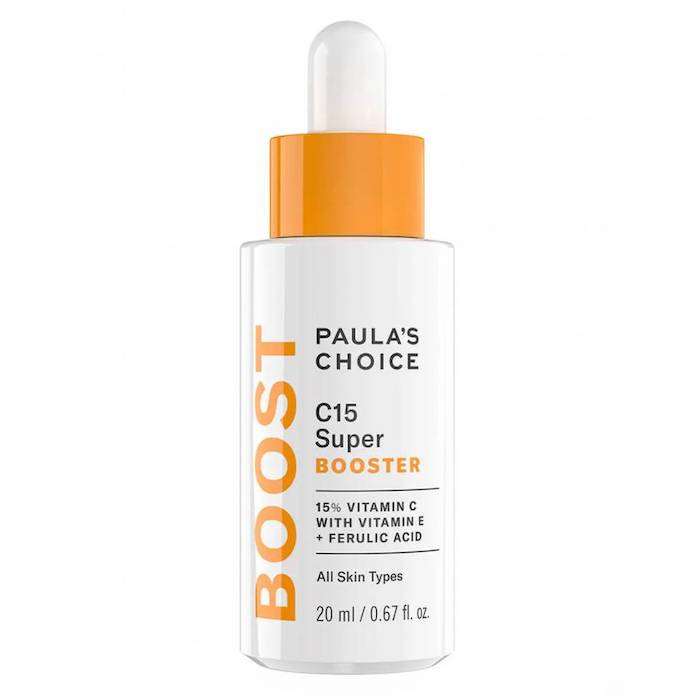
With 15% vitamin C, this serum can improve brightness, firmness, discoloration, and dullness in one fell swoop. It's a booster, so you can also place a few drops into your gentle moisturizer of choice if that suits you.
Customer Review: "This is the first vitamin C serum to really work for me! The bottle last so long and I noticed my skin was so clear and radiant after consistent use. I struggle with acne and suffered post acne spots and blemishes but this product really helped clear that."
Product Details: 0.67-ounce bottle with dropper
Best Budget: Naturium Vitamin C Super Serum Plus
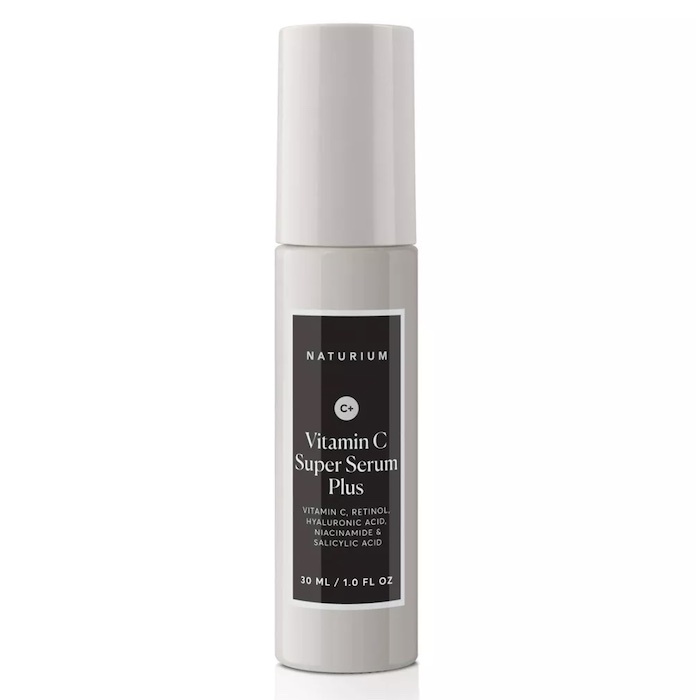
With vitamin C, retinol, niacinamide, and salicylic acid, this serum does a little bit of everything.
Customer Review: "The best ingredients in one serum. I love the way this goes onto my skin since it's not sticky and absorbs very quickly. It blurs the fine lines and wrinkles, and I've seen an overall improvement in my skin. Highly recommend."
Product Details: 1.0-ounce bottle with pump
Best Drugstore: La Roche-Posay 10% Pure Vitamin C Anti-Aging Face Serum
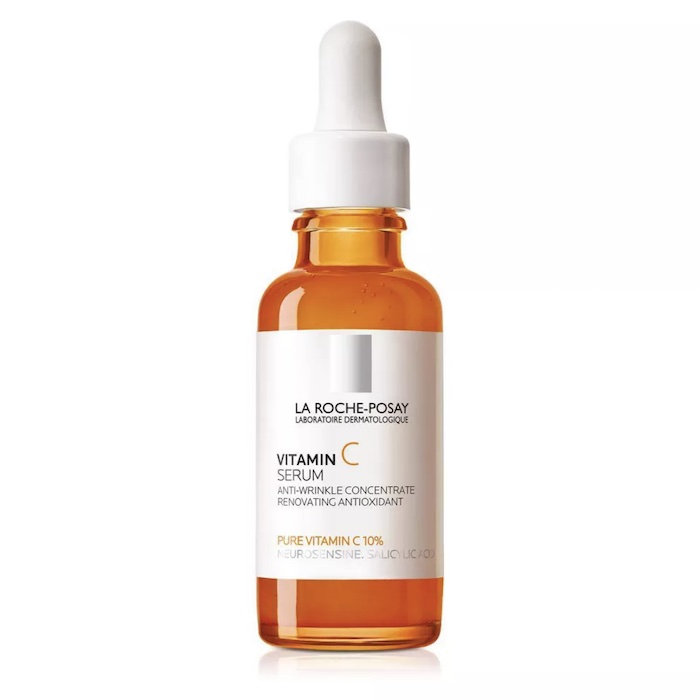
One of my favorite French pharmacy brands, La Roche-Posay, makes this 10% vitamin C serum. It also contains both hyaluronic and salicylic acids for extra benefits.
Customer Review: "I like this product more than some that can be more expensive. When I use this, I see a difference in my skin within a couple of days I feel like it really lightens my dark spots and gives my skin glow and tone."
Product Details: 1.0-ounce bottle with dropper
This article was originally published at an earlier date and has been updated.

Kaitlyn McLintock is a Beauty Editor at Who What Wear. She has 10 years of experience in the editorial industry, having previously written for other industry-leading publications, like Byrdie, InStyle, The Zoe Report, Bustle, and others. She covers all things beauty and wellness-related, but she has a special passion for creating skincare content (whether that's writing about an innovative in-office treatment, researching the benefits of a certain ingredient, or testing the latest and greatest at-home skin device). Having lived in Los Angeles, California, and Austin, Texas, she has since relocated back to her home state, Michigan. When she's not writing, researching, or testing beauty products, she's working through an ever-growing book collection or swimming in the Great Lakes.